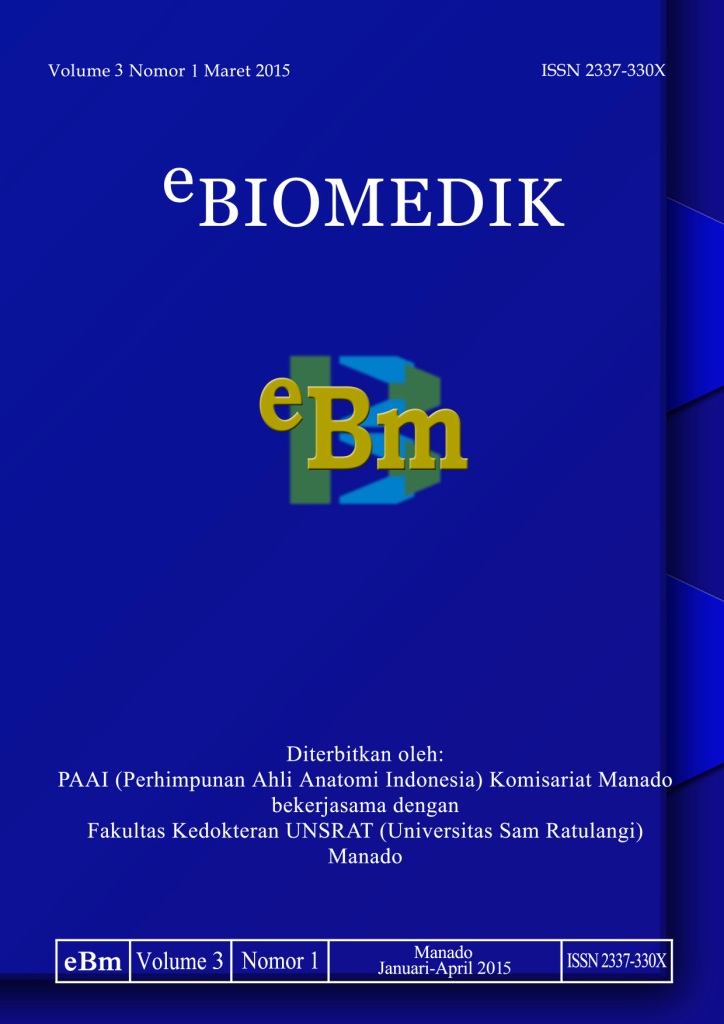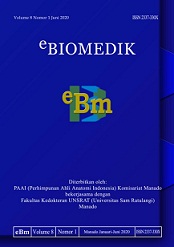ISOLASI DAN IDENTIFIKASI BAKTERI AEROB YANG DAPAT MENYEBABKAN INFEKSI NOSOKOMIAL DI RUANGAN INSTALASI GIZI BLU RSUP PROF. DR. R. D. KANDOU MANADO
DOI:
https://doi.org/10.35790/ebm.v3i1.6644Abstract
Abstract: Kitchen of hospital to be a part or unit of a hospital that is not less important as other services in the hospital , because it provides direct services to patients through the food served by nutritional care . Nosocomial infections are infections that occur during hospitalization where the infection does not exist at the time of admission to the hospital . Infections that occur more than 48 hours after hospital admission . Most infections occur in hospitals is caused by external factors , ie diseases which spread from food and cutlery . Implementation of the food was less qualified health care, in addition to extending the treatment process can also cause cross-infections or nosocomial infections which can be through the cutlery and food . Purpose: To determine the presence of aerobic bacteria that can cause nosocomial infections in the kitchen of BLU Prof. Dr R. D. Kandou Manado .Method: This study was a prospective descriptive study that analyzed 24 samples on cutlery and 6 samples of food in kitchen of BLU Nutrition Dr Prof. Dr R. D. Kandou Manado. Result: From the results of this study were found 11 species of bacteria such as Bacillus subtilis (33,3%), a gram-negative cocci (10%) , Lactobacillus (10%), Enterobacter agglomerans (6,7%), Serratia rubidaea (6,7%), Providencia stuartii (3,3%), Serratia liquefaciens (3,3%), Providencia rettgeri (3,3%), Vibrio cholera (3,3%), Enterobacter cloacae (3,3%), Enterobacter aerogenes (3,3%).
Conclusion: The conclusion of this study showed that the most commonly found bacteria was Bacillus subtilis (33,3%).
Keywords: nosocomial infection, kitchen of hospital, bacteria.
Abstrak: Instalasi gizi menjadi bagian atau unit kerja di rumah sakit yang tidak kalah pentingnya dengan pelayanan lain di rumah sakit, karena memberikan pelayanan langsung kepada pasien melalui makanan yang disajikan oleh asuhan gizi. Infeksi nosokomial adalah infeksi yang terjadi selama perawatan di rumah sakit dimana infeksi tersebut tidak ada pada saat pasien masuk ke rumah sakit. Infeksi yang timbul lebih dari 48 jam setelah masuk rumah sakit. Kebanyakan infeksi yang terjadi di rumah sakit lebih disebabkan oleh faktor eksternal, yaitu penyakit yang penyebarannya ke makanan dan alat makan. Penyelenggaraan makanan yang kurang memenuhi syarat kesehatan, selain memperpanjang proses perawatan juga dapat menyebabkan timbulnya infeksi silang atau infeksi nosokomial yang diantaranya dapat melalui alat makan dan makanan. Tujuan: Untuk mengetahui adanya bakteri aerob yang dapat menyebabkan infeksi nosokomial di ruangan Instalasi Gizi BLU RSUP Prof. Dr. R. D. Kandou Manado. Metode penelitian: Penelitian ini merupakan penelitian deskriptif prospektif yang dianalisis secara desktriptif pada 24 sampel alat makan dan 6 sampel makanan di ruangan Instalasi Gizi BLU RSUP Prof. Dr. R. D. Kandou Manado. Hasil: Dari hasil penelitian ditemukan 11 spesies bakteri yaitu Bacillus subtilis (33,3%), Kokus gram negatif (10%), Lactobacillus (10%), Enterobacter agglomerans (6,7%), Serratia rubidaea (6,7%), Providencia stuartii (3,3%), Serratia liquefaciens (3,3%), Providencia rettgeri (3,3%), Vibrio cholera (3,3%), Enterobacter cloacae (3,3%), Enterobacter aerogenes (3,3%). Kesimpulan: Kesimpulan dari penelitian ini menunjukkan bahwa bakteri yang paling banyak ditemukan dalam penelitian ini adalah Bacillus subtilis (33,3%).
Kata Kunci: infeksi nosokomial, instalasi gizi, bakteri.





